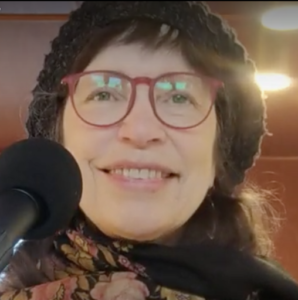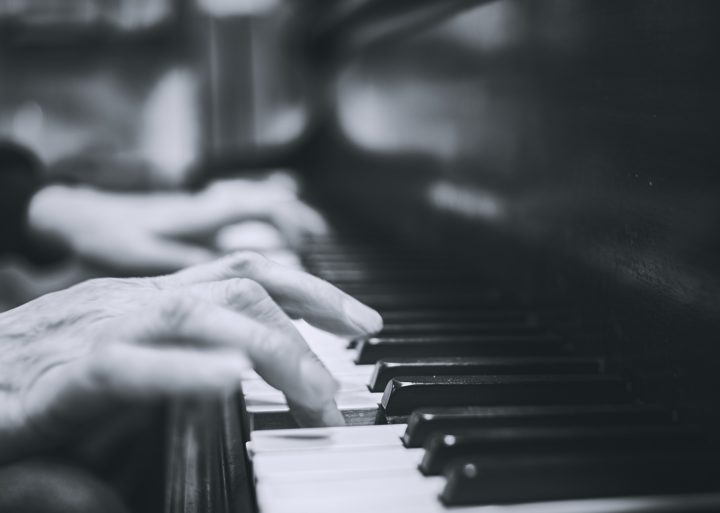ESSAY
by Trudi Richards
My mother had Alzheimer’s. All of us – my mother, all her family, and especially my father, who devoted himself to her care for the last few years of her life – suffered profoundly from it. However, I believe there was also a gift in what happened to her – and it was, for me, of supreme importance to acknowledge this. Because it helped me be at peace with this process – which, in turn, helped me to help my mother be at peace.
Me: “Where do we come from?”
My mom: “I don’t know.”
Me: “Well – where are we going?”
My mom, with great joy: “Oh – I know where we’re going – though I won’t try to put a name to it. But there are lots of places we can stop along the way! And if we write a book together, we’ll be so astounded we’ll forget to die!”
When my mother was alive, we visited every Sunday, for Sunday Dinner, as my parents had done with her parents. My folks were from Nebraska, and it was a hallowed tradition.
One Sunday, we had a big get-together: my sister and her family, my brother and his family, me and my family, and our parents. There were about seven kids, eight adults, and a great spirit of boisterous delight.
But my mom had lost the ability to follow conversation and join in. Once a dynamic woman, leader of the pack, she now felt lost and isolated in a group – unless someone was paying direct attention to her. I knew this, but that Sunday, when everyone was together, I really wanted to be with my brother and sister and all the others; and I wanted a break from the constant vigilance of making sure my mom was OK. We were washing the dishes and laughing and watching the kids’ wild antics – and forgetting my mom.
I was exchanging stories with my brother and munching leftovers when my dad drew me aside with a contained franticness.
“Will you come out here and see if you can keep her from leaving?”
“Oh – OK.” I followed him into the garage. My mother was sitting in the driver’s seat of the car. The garage door was wide open behind her.
“Come on Betty, get in.” Betty, the fat golden retriever, sat there undecided. “We’re leaving this place.”
My mother hadn’t driven for three years.
“Hi!” I plunged into my role. “Where are you going?”
“We’re going home.” She was wearing my grandfather’s face, the Depression era face of bitter resentment.
“Don’t go yet – I wanted to spend some time with you! Let’s go on a walk.” I felt she could read right through the ruse. I was pleading, but I didn’t know what else to do. I bent down to look in her eyes and took her hand. She remained sitting, obdurate, but I could feel a little give.
“Well – OK,” she muttered. I tugged gently, and she began to climb out of the car. To give her what independence I could, I let go of her hand and walked out the garage door, into the evening sun. She began to follow, but at the last minute, noticing the dog and the open car door, she said, “Betty! Get in the car. We’re going! We’re not going to stay here with these people.” My dad, helplessly following all our moves, was hovering silently on the perimeter.
“Come on!” I pleaded, “Let’s go on a walk, please!” I knew this semi-frantic begging was a mistake, but I couldn’t generate anything else. Forgetting there was no key in the car, I thought she might really get in again and drive away. I sought her unwilling hand again, “Come on, come with me!” She pushed weakly at me. “Oh, whatever for?! Go away!” But, then something shifted ever so slightly, and she did follow me. I stood behind the car and leaned on it, looking out at the hills as if admiring the evening. “Look how beautiful it is!” She stood beside me, and I put my arm around her thin shoulders, standing close. Stiff, unresponsive, she glanced sneeringly at me.
“What’s happening?” I asked her, “What’s wrong?”
“This is a terrible place.”
“I think it’s great. What’s the problem?”
“Everyone hates each other.”
“I thought it was quite the opposite, everyone’s having a great time.” I felt stupid. I knew this was the wrong thing to say – I just couldn’t seem to find the key to helping her out of this state. I knew she felt left out. All the unresolved insecurities of her long life, which she had always pushed away through reason and determination, were flooding over her.
I kept my arm around her shoulders, response or no response. “Mom, will you play some music for me?” She still played the piano, an ability which uncannily remained intact; in fact, although her technique sometimes stumbled, her playing seemed to be getting more and more emotionally expressive. “Oh – ” she turned to me, a new light kindling in her eyes – “all right!”
Relief. We went in, to the grand piano in the living room. The others, probably noticing what was going on, had gone somewhere else. I sat beside her on the bench, snuggling up to her. She laid her brown, oak-tree hands, on the keys. Brahms. It flowed out of her, my tears flowed out of me. I didn’t have to hide them from her. She had no criticism. We submerged in a bath of pure, powerful emotion.
My father had been watching, listening, from the shadows. After the first piece, he shyly approached, “Is there room for me?” My mom looked up at him with affection, “Of course!” We slid down on the small bench, and he perched on the end, beside me. I put my arms around them both, and hugged them tightly. I loved them so much. My mother turned toward us gaily, “Isn’t this wonderful? Isn’t life amazing?”
She played and played. One piece turned into another. All the elements of her ancient repertoire – from classical to ragtime and jazz to her own passionate improvisation – entwined and intermingled, creating their own marvelous evolution. She played a song from their courtship, “Come, come, I love you only,” and my father joined her in his pure old tenor. The tears coursed down my face. I didn’t hide them even from my father. We sat together in precious oneness, something we had never been able to find when my mother was “rational,” protected like the rest of us by her armor of reason. Now, in her nakedness, she had been released – and had released us as well – from that reasonable prison.
Finally, after fifteen or twenty minutes, she played a final chord, and with reverence, sat, head bowed, in silence. Then she turned again, smiling and peaceful, to look into our eyes. Her joy blinded me with its light. “Thank you!” she said. “Aren’t we lucky?!”
About the writer:
Trudi Lee Richards
 Siloist writer, poet, and singer-songwriter; curator of Winged Lion Press Cooperative; Spanish-English translator. Published work includes The Confessions of Olivia; On Wings of Intent, a biography of Silo; Soft Brushes with Death, a Jorge Espinet Primer; Fish Scribbles; and Experiences on the Threshold. Ongoing projects include audio recordings and possibly a podcast of her literary and musical work. Publishing exploits from the pre-internet past include Human Future, an independent review published from 1989-96 in San Francisco, CA; and La Mamelle, a San Francisco arts publication of the ’70s for which she was co-founder. A graduate of Stanford University, she is the mother of five grown kids/stepkids and five step-grandkids. She currently lives in Portland, Oregon, where she is a member of the Portland Community of Silo’s Message.
Siloist writer, poet, and singer-songwriter; curator of Winged Lion Press Cooperative; Spanish-English translator. Published work includes The Confessions of Olivia; On Wings of Intent, a biography of Silo; Soft Brushes with Death, a Jorge Espinet Primer; Fish Scribbles; and Experiences on the Threshold. Ongoing projects include audio recordings and possibly a podcast of her literary and musical work. Publishing exploits from the pre-internet past include Human Future, an independent review published from 1989-96 in San Francisco, CA; and La Mamelle, a San Francisco arts publication of the ’70s for which she was co-founder. A graduate of Stanford University, she is the mother of five grown kids/stepkids and five step-grandkids. She currently lives in Portland, Oregon, where she is a member of the Portland Community of Silo’s Message.










